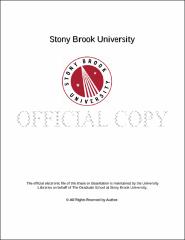| dc.identifier.uri | http://hdl.handle.net/11401/77495 | |
| dc.description.sponsorship | This work is sponsored by the Stony Brook University Graduate School in compliance with the requirements for completion of degree. | en_US |
| dc.format | Monograph | |
| dc.format.medium | Electronic Resource | en_US |
| dc.language.iso | en_US | |
| dc.publisher | The Graduate School, Stony Brook University: Stony Brook, NY. | |
| dc.type | Dissertation | |
| dcterms.abstract | A signature is a data pattern of interest in a large data file or set of large data files. Such signatures that need to be found arise in applications such as DNA sequence analysis, network intrusion detection, biometrics, large scientific experiments, speech recognition and sensor networks. Related to this is string matching. More specifically we envision a problem where long linear data files (i.e flat files) contain multiple signatures that are to be found using a multiplicity of processors (parallel processor). This paper evaluates the performance of finding signatures in files residing in the nodes of parallel processors configured as trees, two dimensional meshes and hypercubes. We assume various combinations of sequential and parallel searching. A unique feature of this work is that it is assumed that data is pre-loaded onto processors, as may occur in practice, thus load distribution time need not be accounted for. Elegant expressions are found for average signature searching time and speedup, and graphical results are provided. Expressions for speedup for divisible load scheduling for a four node cyclic network are found. Load distribution when there are multiple paths for such distribution have received little attention. In this first study speedup is calculated for a wide variety of scheduling assumptions. Comparisons between the different scheduling policies are made. An integrated optimization problem which involves minimizing the monetary cost of operation and minimizing solution time (makespan) which has computer utility-like applications is investigated. A divisible load model of a bus interconnection network is considered. The trade-offs between monetary cost and solution time is found via a heuristic algorithm. The algorithm is improved compared to an earlier algorithm. Trade-off issues are examined. In this paper we confirm the work of Shaklevich. | |
| dcterms.available | 2017-09-20T16:52:48Z | |
| dcterms.contributor | Milder, Peter | en_US |
| dcterms.contributor | Robertazzi, Thomas G | en_US |
| dcterms.contributor | Tang, Wendy | en_US |
| dcterms.contributor | Arkin, Esther. | en_US |
| dcterms.creator | Ying, Zhongwen | |
| dcterms.dateAccepted | 2017-09-20T16:52:48Z | |
| dcterms.dateSubmitted | 2017-09-20T16:52:48Z | |
| dcterms.description | Department of Electrical Engineering. | en_US |
| dcterms.extent | 136 pg. | en_US |
| dcterms.format | Monograph | |
| dcterms.format | Application/PDF | en_US |
| dcterms.identifier | http://hdl.handle.net/11401/77495 | |
| dcterms.issued | 2014-12-01 | |
| dcterms.language | en_US | |
| dcterms.provenance | Made available in DSpace on 2017-09-20T16:52:48Z (GMT). No. of bitstreams: 1
Ying_grad.sunysb_0771E_11933.pdf: 2005213 bytes, checksum: 6a6bad9f724ee8f3d7220068acf48265 (MD5)
Previous issue date: 1 | en |
| dcterms.publisher | The Graduate School, Stony Brook University: Stony Brook, NY. | |
| dcterms.subject | bus network, Cyclic network, divisible load theory, monetary cost, Signature, tree network | |
| dcterms.subject | Electrical engineering | |
| dcterms.title | Signature Search and Computing Cost Optimization in Distributed Load Networks | |
| dcterms.type | Dissertation | |

